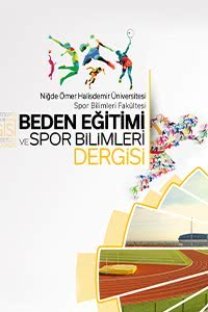The comparison of physical and physiological characteristics of junior elite wrestlers
Genç elit güreşçilerin fiziksel ve fizyoloik özelliklerinin karşılaştırılması
___
- 1. Abellán, A.M. Pallarés, J.G. Gullón, J.M.L. Otegui, X.M. Baños, V. M. Moreno, A.M., “ Anaerobic Factors To Predict Wrestling Performance” Cuadernos De Psicología Del Deporte 2010. Vol.10, Núm. Suple. Pp. 17-23, 2010.
- 2. Akyüz, M. Koç, H. Uzun, A. Özkan, A. Taş, M., “An Examination of Some Physical Fitness and Somatotype Characteristics of Young Wrestlers in Turkısh National Team” Atabesbd; 12 (1) : 41-47, 2010.
- 3. Bloomfield, J. Ackland, T.R. Elliot, B.C., “Applied Anatomy and Biomechanics in Sport. Blackwell Scientific Publications, 1994.
- 4. Clark, R.R. Oppliger, R.A. Sullivan, J.C., “Cross- Validation of The Ncaa Method To Predict Body Fat For Minimum Weight in Collegiate Wrestlers” Clin J Sport Med, 2002; Sep;12(5):285–90, 2002.
- 5. Demirkan, E. Kutlu, M. Koz, M., “The Segmental Body Composition Comparison of Freestyle and Greco-Roman Style Wrestlers with Bioelectrical Impedance Method ” Selçuk University Journal of Physical Education and Sport Science , 2011; 13 (3): 340–343, 2011.
- 6. Franchini, E. Del Vecchio, F.B. Matsushigue, K.A. Artioli, G.G., “Physiological Profiles of Elite Judo Athletes” Sports Med. 1;41(2):147-66, 2011.
- 7. Grindstaff, T.L. Potach, D.H.,“Prevention of Common Wrestling Injuries” National Strength and Conditioning Association 28 (4): Pg: 20–28, 2006.
- 8. Horswill, C.A., “Applied Physiology of Amateur Wrestling” Sport Med,14: 114–143, 1992.
- 9. Horswill, C.A. Scott, J.R. Galea P., “Comparison of Maximum Aerobic Power, Maximum Anaerobic Power, And Skinfold Thickness of Elite and Nonelite Junior Wrestlers” Int J Sports Med. 10(3) 165-8, 1989.
- 10. Karninčić, H. Tocilj, Z. Uljević, O. Erceg, M., “Lactate Profile During Greco-Roman Wrestling Match” Journal of Sports Science And Medicine, 8(Cssı 3), 17-19, 2009.
- 11. Kraemer, W.J. Fry, A.C. Rubin, M.R, Triplett- Mcbride, T. Gordon, S.E. Koziris, L.P. Lynch, J.M. Volek, J.S. Meuffels, D.E. Newton, R.U. Fleck, S.J., “Physiological and Performance Responses to Tournament Wrestling” Med Sci Sports Exerc, Aug;33(8):1367-78, 2001.
- 12.Mirzaei, B. Curby, D.G. Rahmani-Nia, F. Moghadasi, M., “Physiological Profile of Elite İranian Junior Freestyle Wrestlers” J Strength Cond Res, 23(8): 2339–2344, 2009.
- 13.Mirzaei, B. Curby, D.G. Barbas, I. Lotfi, N., “Physical Fıtness Measures Of Cadet Wrestlers” İnternational Journal of Wrestling Sciences,1(1), 2011.
- 14.National Wrestling Coaches Assocıatıon ”Wrestling Minimum Weight Certification Program” 2009.
- 15.Nilsson, J. Csergö, S. Gullstrand, L. Tveit, P. Refsnes, P.E.,“Work-Time Profile, Blood Lactate Concentration And Rating of Perceived Exertion in The 1998 Greco-Roman Wrestling World Championship” J Sports Sci. Nov;20(11):939-45, 2002.
- 16. Pallares, J.G. Lopez, J.M. Muriel, G.X. Mıkel Izquierdo, A.D., “Physical Fitness Factors to Predict Male Olympic Wrestling.Performance” Eur J Appl Physiol, 111:1747–1758, 2011.
- 17. Pallarés, J.G. López-Gullón, J.M. Torres-Bonete, M.D. Izquierdo, M., “Physical Fitness Factors to Predict Female Olympic Wrestling Performance and Sex Differences” J Strength Cond Res. 2012 Mar;26(3):794-803, 2012.
- 18.Rahmani- Nia, F. Mirzaei, B. Nuri, N., “Physiological Profile of Elite İranian Junior Greco- Roman Wrestlers” I.J. Fitness 3, İssue 2, Pp. 49- 54, 2007.
- 19.Roemmich, J.N. Frappier, J.P., “Physiological Determinants of Wrestling Success in High School Athletes” Pediatric Exercise Science,5,134-144, 1993.
- 20. Sharon, A. Evans, J. M. Eckerson, T. Housh, J. Glen O. J., (1993). “Muscular Power of The Arms in High School Wrestlers” Pediatric Exercise Science, 5, 72-77, 1993.
- 21. Song, T.M.K. Garvie, G.T., “Anthropometric, Flexibility, Strength,and Physiological Measures of Canadian Wrestlers and Comparison of Canadian and Japanese Olympic Wrestlers” Can J Appl Sport Sci; 5: 1-8, 1980.
- 22.Utter, A.C., “The New National Collegiate Athletic Association Wrestling Weight Certification Program and Sport-Seasonal Changes in Body Composition of College Wrestlers” J Strength Cond Res,Aug;15(3):296–301, 2001.
- 23.Utter, A.C. Goss, F.L. Swan, P.D. Harris, G.S. Robertson, R.J. Trone, G.A., “Evaluation of Air Displacement For Assessing Body Composition of Collegiate Wrestlers” Med Sci Sports Exerc Mar, 35(3):500–5, 2003.
- 24. Yoon, J., “Physiological Profiles Of Elite Senior Wrestlers” Sports Med, 32 (4): 225-233, 2002.
- 25.Woźniak, E. Lutosławska, G. Kosmol, A. Zuziak, S., “The Effect of Training Experıence on Arm Muscle Anaerobic Performance in Wrestlers” Human Movement, Vol. 7 (2), 147–152, 2006.
- ISSN: 1307-6477
- Yayın Aralığı: Yılda 3 Sayı
- Başlangıç: 2007
- Yayıncı: Niğde Üniversitesi Beden Eğitimi ve Spor Yüksek Okulu
The comparison of some physical fitness for individual and team athletes
The neurophysiological effects of whole body vibration training
Evaluation of vocational self esteem levels of the Turkish coaches
YUNUS YILDIRIM, HÜSEYİN KIRIMOĞLU, Gülşen ÇOKLUK FİLAZOĞLU
Comparison of jumping performance with different methods of volleyball and wrestling athletes
TÜLİN ATAN, PELİN AKYOL, OSMAN İMAMOĞLU
The comparison of physical and physiological characteristics of junior elite wrestlers
Erkan DEMİRKAN, RAFET ÜNVER, MEHMET KUTLU, Mitat KOZ
HALİL İBRAHİM CİCİOĞLU, ÖZLEM ORHAN, ÇAĞRI ÇELENK
Physical education teacher candidates’ perceptions towards community service course
Predictors of job satisfaction of the personnel working in Turkish sports media
Opinions of physical education teachers about lessons during the preparation for teaching
